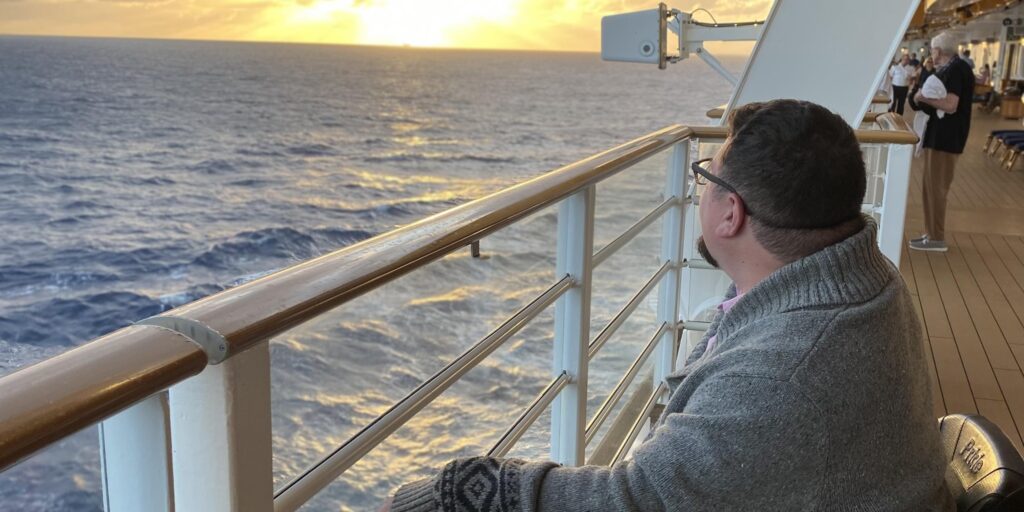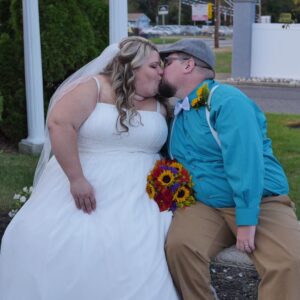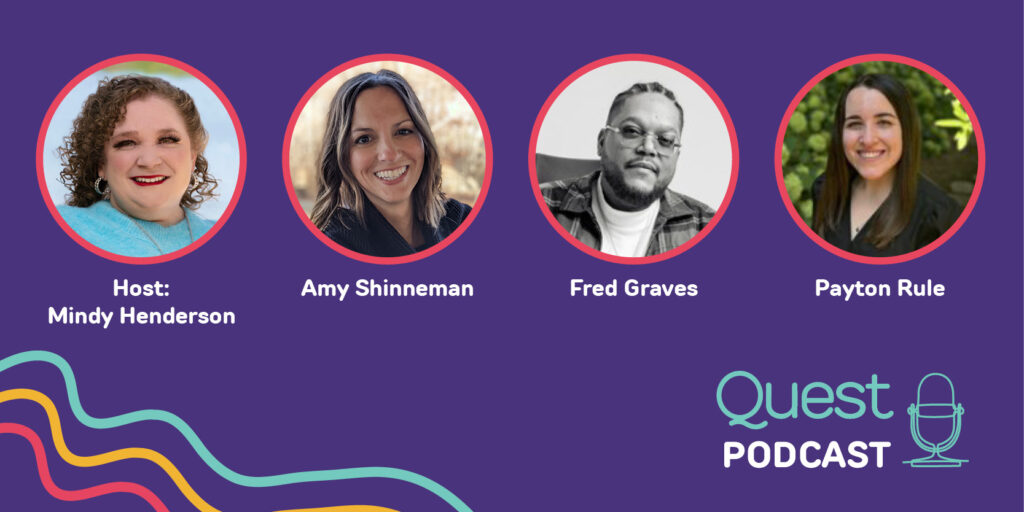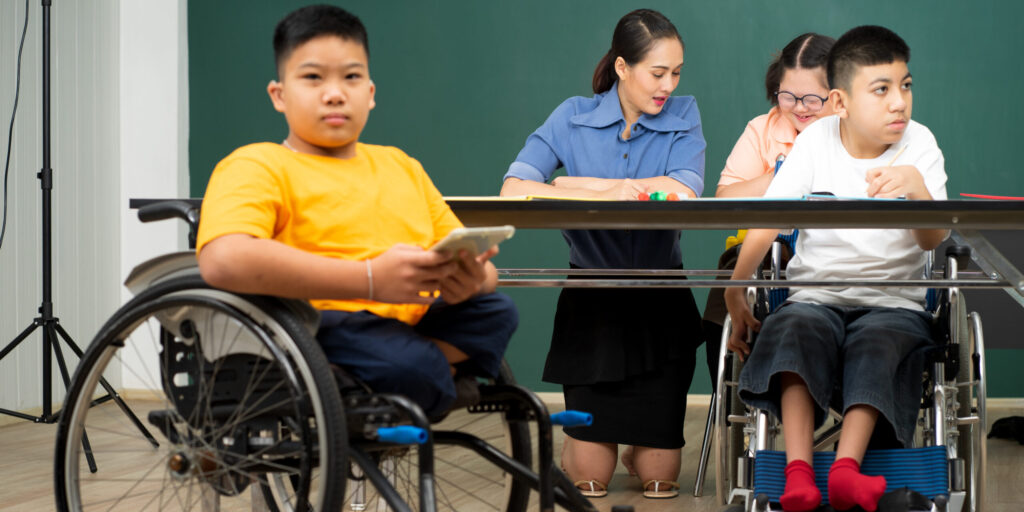
MDA Ambassador Guest Blog: Fatherhood and Adaptive Parenting
By Matt Curcio | Tuesday, June 11, 2024
5 Second Summary
MDA Ambassadors play an essential role in furthering MDA’s mission while representing and empowering the neuromuscular disease community. Quest Ambassador Guest Blog series provides a platform to share their personal stories, perspectives, and experience.
Matt Curcio is a writer, speaker, and advocate. Matt lives in New Jersey with his wife, cats, and children. He lives with Collagen 6 Related Dystrophy. He specializes in traveling with a disability, self-advocacy, the intersection of faith and disability, and parenting while disabled.
Nothing scared me more than the day that my wife and I said yes to our first foster placements. My fears about fatherhood while living with a disability have always weighed heavy on me, as tends to be the way with our greatest hopes and dreams. The more precious the hope and desire, the more fragile and susceptible to damage.

Matt Curcio and his wife
For many of us living with disabilities, we have internalized the belief that our physical bodies are not compatible with the physicality of parenting. It wasn’t until I was twenty years old that I met my first dad with a disability. I am sure you have heard it before, but representation matters. Though I had many loved ones in my life who assured me that I would be a “great father” someday, it was beyond me to conceptualize it as a reality until I saw it in person.
Even after I saw it in real life, by then I was so indoctrinated into my own self-doubt and internalized ableism, it wasn’t until I was midst parenting seven years later that I realized I could in fact accomplish what I had always dreamed. After that realization my next revelation was comical: I had been engaging in parental roles for at least a decade prior to my first children coming into my life.
I think, when I consider what amazes me most about those of us with physical disabilities, I always land on our adaptability, our flexibility, our resourcefulness, and our resilience. Now seven years into being a dad, I must chuckle to myself as I recognize that the disability that, for so much of my life, I had resolved myself to seeing as my greatest obstacle towards my goals, was in many ways my greatest preparation for my greatest dreams.
Parenting takes an immense amount of adaptability, flexibility, resourcefulness, and resilience. Whether you are raising an infant for the first time, or creating a home for a teenager that needs safety and compassion, you are sunk without these attributes.
I must concede that, from my own perspective, having these skills developed due to a disability imparted on me against my own will is not often my favorite reality. I adapt to survive. I am flexible because the world is rigid. I am resourceful because supports are rarely available. I am resilient because I have never had another choice. I do not intend to be presumptuous, but it is my experience that many people with disabilities can relate directly to what I am writing. Still, the tool kit has been built and, in the same breath that I may curse why I have these attributes, I must express gratitude for the simple fact that I have been undeniably prepared to parent uniquely. While our disabilities are not a means to an end, I have seen first-hand over and over again how our culturally perceived “weakness” is a catalyst for a potent dose of vulnerability and authenticity that young people deeply crave.
I see now as a dad that fatherhood is more than rearing biological children. In fact, fatherhood and parenting sometimes is being an uncle, a mentor, a sibling, a leader, a teacher, or a friend. It takes a village to raise young people. It takes so many players to raise and support people, and your disability does not exclude you from participating in that great work. I spent twenty-seven years as an uncle, friend, mentor, and teacher before I became a dad. And when I became a dad, it was another chapter of adapting. For my wife and I, our parenting journey pivoted away from conceiving children towards receiving children. Some children have been with us for a season, and some will be with us forever, taking our last name. But all our children have shared the same need for a loving and safe home. Especially a home that is adaptable and creative, a home that is flexible and forgiving, a home that is resourceful and advocating, a home that is resilient and patient.
Whether you dream of biological children, adoption, fostering, or a combination of “all of the above”, allow your disability to be your teacher not your obstacle. Does our family look different than most other families? Sure does. Do I still catch myself comparing myself to the other dads when I drop my son off at soccer practice? Sure do.
I guarantee, though, that no physical representation of parenthood matters more than presence. If you can be present, you can be a parent too. I cannot think of a better way to end this than sharing some comments from my kids about having a disabled dad:
“My favorite part is riding on your scooter with you.”
“Sometimes I am disappointed that there are some things we can’t do together, but I love watching Star Wars with you and going on Wawa runs together and snuggling.”
“Tell the people don’t be afraid to be a daddy and that I love doing Legos with you.”
“Tell them to never be afraid to accomplish their goals just because of the way you’re born.”
One of my favorite things about kids is their simple worldview. No matter your age reading this, understand that parenting is not about what you can or cannot do. Parenting is about who you are. The world needs more parents and parent figures just like you.
Next Steps and Useful Resources
- To learn more about parenting, visit here.
- To learn more about MDA’s Mental Health Hub, visit here.
- Listen to a Quest Podcast conversation with Megan DeJarnett, a speaker and inclusion advocate living with spinal muscular atrophy (SMA), about why she wrote her first children’s book, “No Such Thing as Normal.”
- The day her daughter left for college wasn’t the first time Linda VanVliet practiced letting her go. Read how Linda helped her daughter prepare to be independent.
- MDA’s Resource Center provides support, guidance, and resources for patients and families. Contact the MDA Resource Center at 1-833-ASK-MDA1 or ResourceCenter@mdausa.org
- Stay up-to-date on Quest content! Subscribe to Quest Magazine and Newsletter.
TAGS: Ambassador Guest Blog, Ambassadors, Community, Parenting, Relationships
TYPE: Blog Post
Disclaimer: No content on this site should ever be used as a substitute for direct medical advice from your doctor or other qualified clinician.




